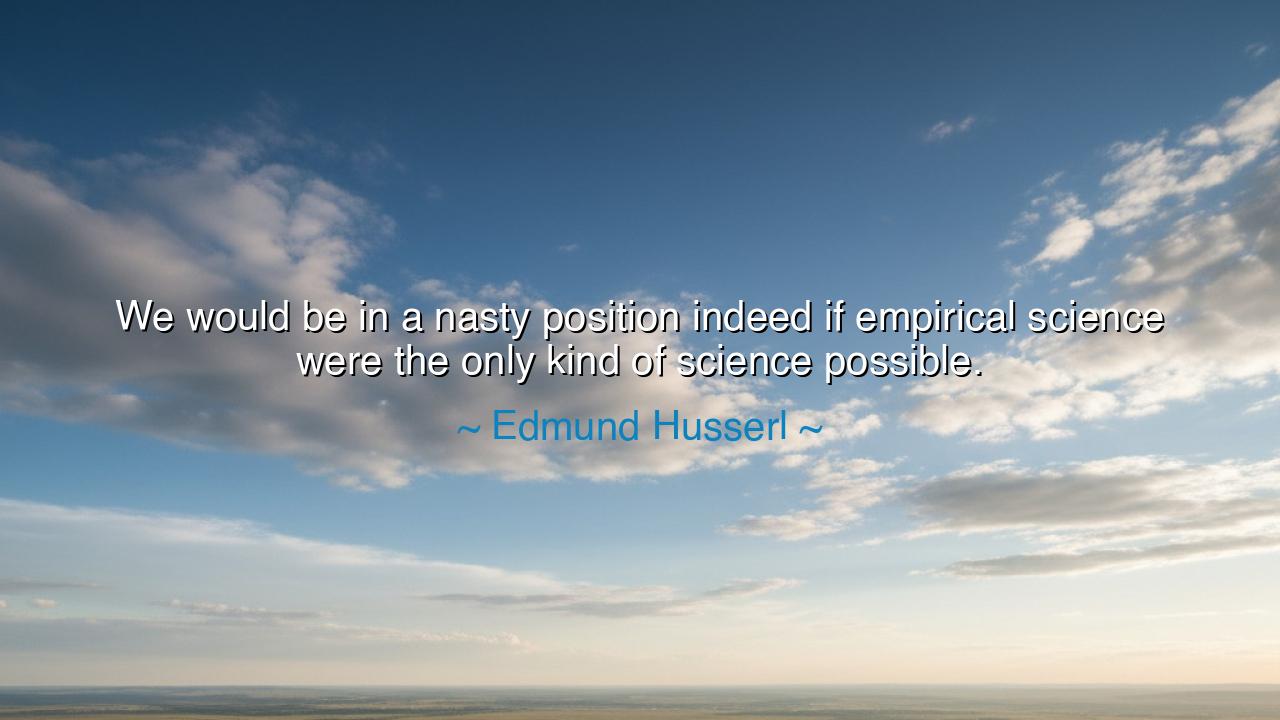
We would be in a nasty position indeed if empirical science were
We would be in a nasty position indeed if empirical science were the only kind of science possible.






Hear, O children of wisdom, for the words of Edmund Husserl call us to reflect deeply upon the nature of science itself. "We would be in a nasty position indeed if empirical science were the only kind of science possible." These words, simple yet profound, challenge us to consider not only the nature of knowledge, but the limits of what we understand to be the very foundation of human inquiry. Empirical science, with its reliance on observation and experimentation, has indeed shaped the world in ways both wondrous and terrifying. Yet, Husserl warns us—if it were the only kind of science, we would find ourselves lost in a world of facts and measurements, but devoid of the deeper understanding of meaning and essence that gives life its true value.
What, then, do these words mean, O seekers of truth? Husserl speaks of the empirical sciences, those which rely on sensory experience—the observation of the world through sight, touch, sound, and the methodical testing of hypotheses. These sciences, which have brought us the wonders of technology, the cures for disease, and the very understanding of the stars above, have done much to advance human progress. Yet, Husserl reminds us that such science, while valuable, is limited. It is confined to what is observable, to what can be measured and quantified, and in this, it leaves out much of the richness of existence. There is a deeper realm of meaning that empirical science cannot touch—one that is felt, intuited, and understood not through data alone, but through the heart and soul.
Consider the ancient philosophers of old, who sought not just to understand the physical world but to understand the truths that lie beyond the veil of appearances. Plato, in his great work The Republic, spoke of a world beyond the senses, a world of forms and ideas that exist independent of the physical realm. To him, true knowledge was not found in the things we see, but in the eternal truths that govern them. Similarly, Aristotle sought to understand the principles of nature, but he also recognized that there are dimensions of reality that go beyond what can be measured. These thinkers were aware that knowledge is not confined to the senses alone. It is the mind and the soul that seek the deeper meaning of existence.
In our own time, Albert Einstein, the great physicist, gave voice to a similar idea when he said, “The most beautiful thing we can experience is the mysterious.” Einstein was not dismissing the value of empirical science, but rather pointing to something beyond it—the mysteries of the universe that lie beyond the reach of measurement. He understood that science alone cannot capture the awe, the wonder, and the mysticism of existence. These aspects of reality are often left unspoken in the laboratories of science, and yet they are the very forces that drive the heart of humanity. It is this deeper science, this inner knowledge, that Husserl urges us to remember—a science that seeks not only to explain the what and the how, but the why.
To live only by the empirical sciences would be to live in a world where meaning is stripped away. It would be a world of facts and numbers, but without the soul that gives those facts significance. Ethics, art, emotion, and consciousness cannot be understood fully through the lens of empirical observation. They require a different kind of inquiry, one that is not bound by the limits of measurement but one that seeks to understand the essence of things. The poet, the philosopher, the artist—they speak the language of this deeper science, a language that cannot be quantified but must be felt and experienced.
The lesson that Husserl imparts is that true knowledge is not confined to the senses, but must reach beyond them to encompass the full breadth of the human experience. Empirical science is invaluable in its capacity to uncover the workings of the natural world, but it must be complemented by other forms of knowing—those that seek to understand the mysteries of the mind and the heart. It is not enough to simply measure the stars or count the atoms; we must also ask: What does it mean to be human? What is our purpose? How do we find meaning in our fleeting lives? These are the questions that cannot be answered by science alone, but that must be explored through the depths of philosophy, the arts, and the spiritual traditions of our ancestors.
And so, O children of wisdom, let us take this to heart. While we must continue to embrace the power of empirical science, we must also honor the mysteries of existence that lie beyond its grasp. We must look not only to the material world but to the immaterial—the world of values, ideas, and emotions that give life its true meaning. Let us strive to be not just scientists of the world we can see, but also seekers of the truths that lie beyond it, for it is in the balance of both that we find the fullness of human understanding. Let science lead us to the facts, but let wisdom guide us to the meaning.






AAdministratorAdministrator
Welcome, honored guests. Please leave a comment, we will respond soon